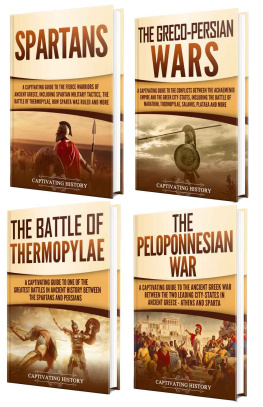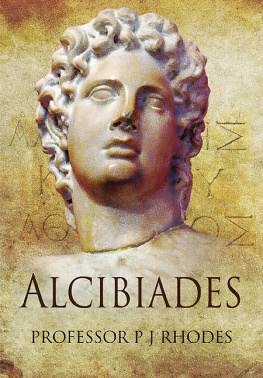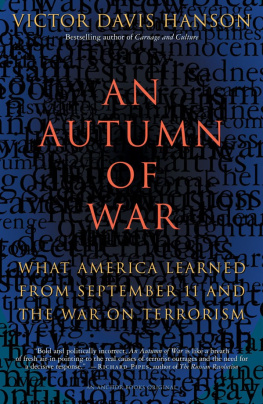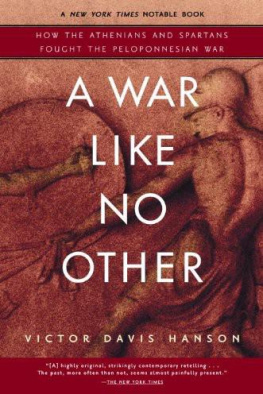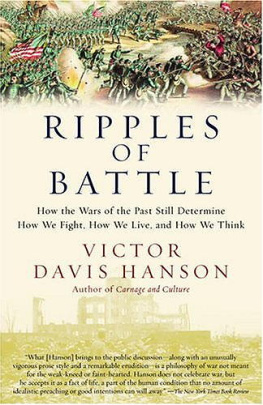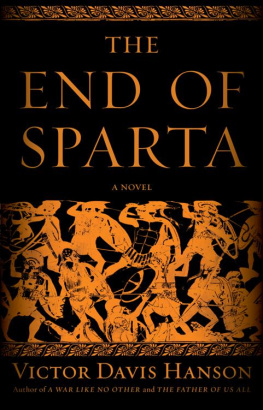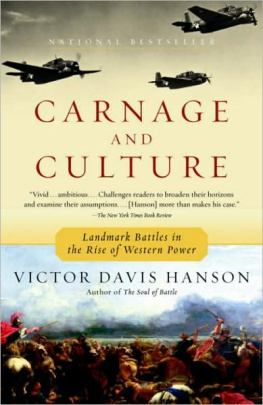Victor Hanson - A War Like No Other: How the Athenians and Spartans Fought the Peloponnesian War
Here you can read online Victor Hanson - A War Like No Other: How the Athenians and Spartans Fought the Peloponnesian War full text of the book (entire story) in english for free. Download pdf and epub, get meaning, cover and reviews about this ebook. year: 2011, publisher: Random House Publishing Group, genre: History. Description of the work, (preface) as well as reviews are available. Best literature library LitArk.com created for fans of good reading and offers a wide selection of genres:
Romance novel
Science fiction
Adventure
Detective
Science
History
Home and family
Prose
Art
Politics
Computer
Non-fiction
Religion
Business
Children
Humor
Choose a favorite category and find really read worthwhile books. Enjoy immersion in the world of imagination, feel the emotions of the characters or learn something new for yourself, make an fascinating discovery.

- Book:A War Like No Other: How the Athenians and Spartans Fought the Peloponnesian War
- Author:
- Publisher:Random House Publishing Group
- Genre:
- Year:2011
- Rating:3 / 5
- Favourites:Add to favourites
- Your mark:
- 60
- 1
- 2
- 3
- 4
- 5
A War Like No Other: How the Athenians and Spartans Fought the Peloponnesian War: summary, description and annotation
We offer to read an annotation, description, summary or preface (depends on what the author of the book "A War Like No Other: How the Athenians and Spartans Fought the Peloponnesian War" wrote himself). If you haven't found the necessary information about the book — write in the comments, we will try to find it.
A War Like No Other: How the Athenians and Spartans Fought the Peloponnesian War — read online for free the complete book (whole text) full work
Below is the text of the book, divided by pages. System saving the place of the last page read, allows you to conveniently read the book "A War Like No Other: How the Athenians and Spartans Fought the Peloponnesian War" online for free, without having to search again every time where you left off. Put a bookmark, and you can go to the page where you finished reading at any time.
Font size:
Interval:
Bookmark:
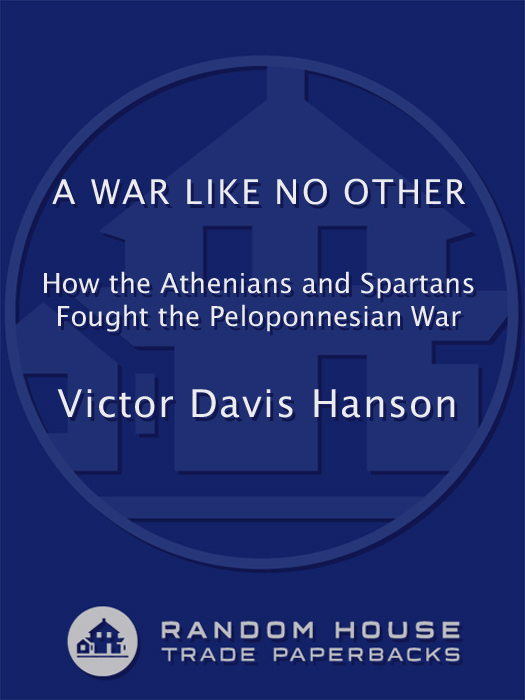
Definitive. Engrossing. A masterpiece. It is difficult to marshal all the requisite superlatives for Victor Davis Hansons new book on the Peloponnesian War. Hanson takes up the story where Donald Kagan, whose four-volume history of that world-altering conflict left off. Kagan provided a sweeping political and strategic overview of the war; Hanson shifts the focus and brings the reader into the guts of battle. Hansons command of his subject is as impressive as his erudition is lightly worn. Hanson, like Thucydides, teaches us about the tragic nature of war.
National Review
The age of Pericles was also a time of famine, pestilence, and atrocity: a Thirty-Year Slaughter. In order to understand the lesson this offers for civilization, one must try to feel it as the Greeks felt it, and reflect on it as they did. In this dual task, Victor Davis Hanson once again demonstrates that his qualifications are unrivaled.
C HRISTOPHER H ITCHENS ,
author of Love, Poverty, and War: Journeys and Essays
This book will immediately become the standard companion volume in English to Thucydides The Peloponnesian War. Its own battle narratives are unexcelled; but its singular merit is its comprehensive and detailed description of how the actual fighting was done, how generals led, and why each sideSparta and Athenswent to war. The author is a man of action and a practicing farmer as well as the premier classical historian and military commentator of our day.
J OSIAH B UNTING III,
author of Ulysses S. Grant
Warfare and Agriculture in Classical Greece
The Western Way of War: Infantry Battle in Classical Greece
Hoplites: The Ancient Greek Battle Experience (editor)
The Other Greeks: The Agrarian Roots of Western Civilization
Fields Without Dreams: Defending the Agrarian Idea
Who Killed Homer? The Demise of Classical Education and the Recovery of Greek Wisdom (with John Heath)
The Wars of the Ancient Greeks
The Soul of Battle: From Ancient Times to the Present DayHow Three Great Liberators Vanquished Tyranny
The Land Was Everything: Letters from an American Farmer
Bonfire of the Humanities (with John Heath and Bruce Thornton)
Carnage and Culture:
Landmark Battles in the Rise of Western Power
An Autumn of War
Mexifornia: A State of Becoming
Between War and Peace
Ripples of Battle: How Wars of the Past Still Determine
How We Fight, How We Live, and How We Think
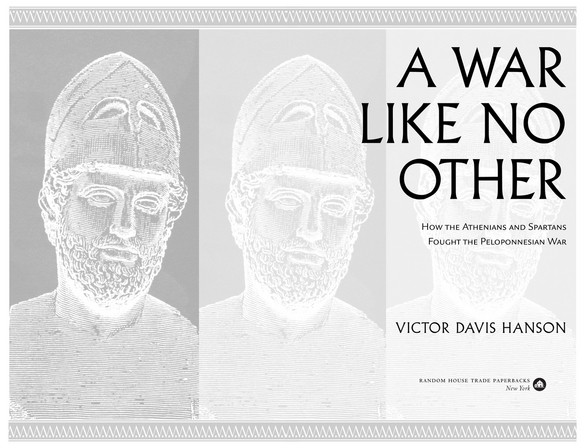
2006 Random House Trade Paperback Edition
Copyright 2005 by Victor Davis Hanson
Maps copyright 2005 by David Lindroth
All rights reserved.
Published in the United States by Random House Trade
Paperbacks, an imprint of The Random House Publishing
Group, a division of Random House, Inc., New York.
R ANDOM H OUSE T RADE P APERBACKS and colophon are trademarks of Random House, Inc.
Originally published in hardcover in the United States
by Random House, an imprint of The Random House
Publishing Group, a division of Random House, Inc., in 2005.
LIBRARY OF CONGRESS CATALOGING-IN-PUBLICATION DATA
Hanson, Victor Davis.
A war like no other: how the Athenians and Spartans
fought the Peloponnesian War / Victor Davis Hanson.
p. cm.
eISBN: 978-1-58836-490-6
I. GreeceHistoryPeloponnesian War, 431404 B.C . I. Title.
DF 229. H 36 2005 938.05dc22 2004062892
www.atrandom.com
v3.1
Professors John Heath and Bruce Thornton
friends and classicists of a quarter century
Why Sparta Fought Athens (480431)
The War Against the Land (431425)
The Ravages of the Plague at Athens (430426)
War in the Shadows (431421)
Hoplite Pitched Battles (424418)
Sieges (431415)
The Disaster at Sicily (415413)
The War at Sea (431404)
Trireme Fighting in the Aegean (411405)
Winners and Losers (404403)
The Spartan and Athenian Empires
The Peloponnesian League and Other Spartan Allies
The Spartan and Athenian Empires
The Athenian Subject States and Allies
In April 404 B.C . the Spartan admiral Lysander finally led his vast armada of ships, crammed with some 30,000 jubilant seamen, into the hated port of Athens at the Piraeus to finish the Peloponnesian War. After the destruction of its imperial fleet at the battle of Aegospotami (Goat Rivers) in the waters off Asia Minor the prior September, the once splendid city of Athens was now utterly defenseless. Worse still was to come. It was soon surrounded, broke, jammed with refugees, starving, and near revolution. Such an end would have seemed utterly inconceivable just three decades earlier when a defiant Pericles promised his democracy victory. But then neither had 80,000 Athenians fallen to plague nor 500 ships been sunk at Sicily and on the Aegean.
Two Spartan kings, Agis and Pausanias, had encamped outside the walls of the city in command of thousands of tough infantrymen of the Peloponnese, the large peninsula south of the Isthmus at Corinth that makes up the southern part of Greece. The people of Athens were still for a time safe behind massive walls, but tens of thousands of refugees inside were cut off from both homegrown and imported foodand waiting for the end. Gone was the old lifeline of imperial tribute by land and sea. To end this growing general famine, Athens finally gave up, agreeing to dismantle most of what little was left of its once renowned fleet, famed fortifications, and vaunted democracy. Thousands of citizens were thus entirely at the mercy of Spartan clemency; perhaps 100,000 residents congregated in the streets, terrified that they might suffer the same fate they had once meted out to so many other Greeks throughout the Aegean.
The conquering Lysander wasted little time in carrying out the terms of the capitulation, most poignantly destroying most of the Long Wallstwo fortified
This book does not answer that question through a strategic account of the conflicts various campaigns. Much less is it a political study of the reasons that caused the Spartans to fight against Athens. Fine narratives in English by George Grote, George Grundy, B. W. Henderson, Donald Kagan, John Lazenby, Anton Powell, Geoffrey de Ste. Croix, and others cover those topics. So there is no need for another traditional history of the Peloponnesian War.
Instead, how did the Athenians battle the Spartans on land, in the cities, at sea, and out in the Greek countryside? What was it like for those who killed and died in this horrific war, this nightmare about which there has been little written of how many Greeks fought, how many perished, or even how all of it was conducted? My aim, therefore, after a brief introduction to the general events of the Peloponnesian War, is to flesh out this three-decade fight of some twenty-four hundred years past as something very human and thus to allow the war to become more than a far-off struggle of a distant age.
From the strange label Peloponnesian War, who imagines bloody civil strife? Most envision instead something akin to the Persian Wars, Macedonian Wars, or Dacian Wars, all tough ancient conflicts that were waged against foreign peoples. But the vast majority of lives lost between 431 and 404 were Greek. The money consumed, the towns sacked, the fields ravagedthese disasters were also mostly Greek. This ancient civil conflict today is called the Peloponnesian War since Westerners are in some respects Athenocentric. Everyone equates Athens with Greece. And while moderns are familiar with Sparta, they hear almost nothing of states such as Corinth, Syracuse, or Thebes, Athens other formidable enemies, who collectively knew the three-decade-long fight quite differently, as the Athenian War to destroy the democracy and its empire.
Font size:
Interval:
Bookmark:
Similar books «A War Like No Other: How the Athenians and Spartans Fought the Peloponnesian War»
Look at similar books to A War Like No Other: How the Athenians and Spartans Fought the Peloponnesian War. We have selected literature similar in name and meaning in the hope of providing readers with more options to find new, interesting, not yet read works.
Discussion, reviews of the book A War Like No Other: How the Athenians and Spartans Fought the Peloponnesian War and just readers' own opinions. Leave your comments, write what you think about the work, its meaning or the main characters. Specify what exactly you liked and what you didn't like, and why you think so.


